
Movie Night with Discussion
Guest: Director Siska
As part of a workshop at the HfG Karlsruhe, the artist Siska will be presenting two films that deal with archives and archaeology. The films are “In the Ruins of Baalbeck Studios” (2017) and “J€sus $aves” (2024, in progress). Through archaeological research and filmic codes, Siska questions processes of archiving, memory and historiography. An introduction and Q&A round off the program. The film evening is a cooperation between the Blauer Salon and the Department of Scenography and Exhibition Design under the direction of Prof. Constanze Fischbeck.
In the Ruins of Baalbek Studios
The story of this film project revolves around the biggest film production studio in the Arab world, and its lost archive. Located on Charles Helou Boulevard in the east of Beirut, the remains of Studio Baalbek, a white villa with open doors, broken windows, and a garden full of wild plants and pine trees, appear like a lifeless place. But even though the once thriving production house, established in 1962, fell victim to the Lebanese civil war (1975–1990), it has nevertheless left behind a treasure of an archive of voice recordings and films that still are famous throughout the entire Arab region, spanning productions from Erbil to Amman, and from Damascus to Cairo. Negligence by the Lebanese authorities has led to mold growing on parts of this archive inside the damp underground warehouses. Bayna Hayakel Studio Baalbeck shows the ruination of film heritage in Lebanon, navigated through the country’s cinematic heydays in the late 1960s and early 1970s – a period that witnessed a rise of Egyptian producers and directors moving to Lebanon to make films partly due to Nasser’s nationalization of Egyptian cinema.
J€SUS $AVES
J€SUS $AVES explores the archaeology of Hollywood and Arab fetishism in cinema and the early film industry. It is a reflection on how the influence of Hollywood can shape our perception of ethnicity, gender and power. I started researching and shooting 16mm films in Los Angeles. In the dunes near Guadalupe, California, halfway between San Francisco and L.A., Cecil B. DeMille built the largest film set in history for his silent film The Ten Commandments. The set was called “The City of the Pharaoh”. After filming, DeMille had the entire set dismantled and secretly buried in the dunes. J€SUS $AVES takes this as an opportunity to explore themes such as cultural appropriation and belonging.

